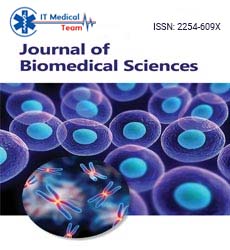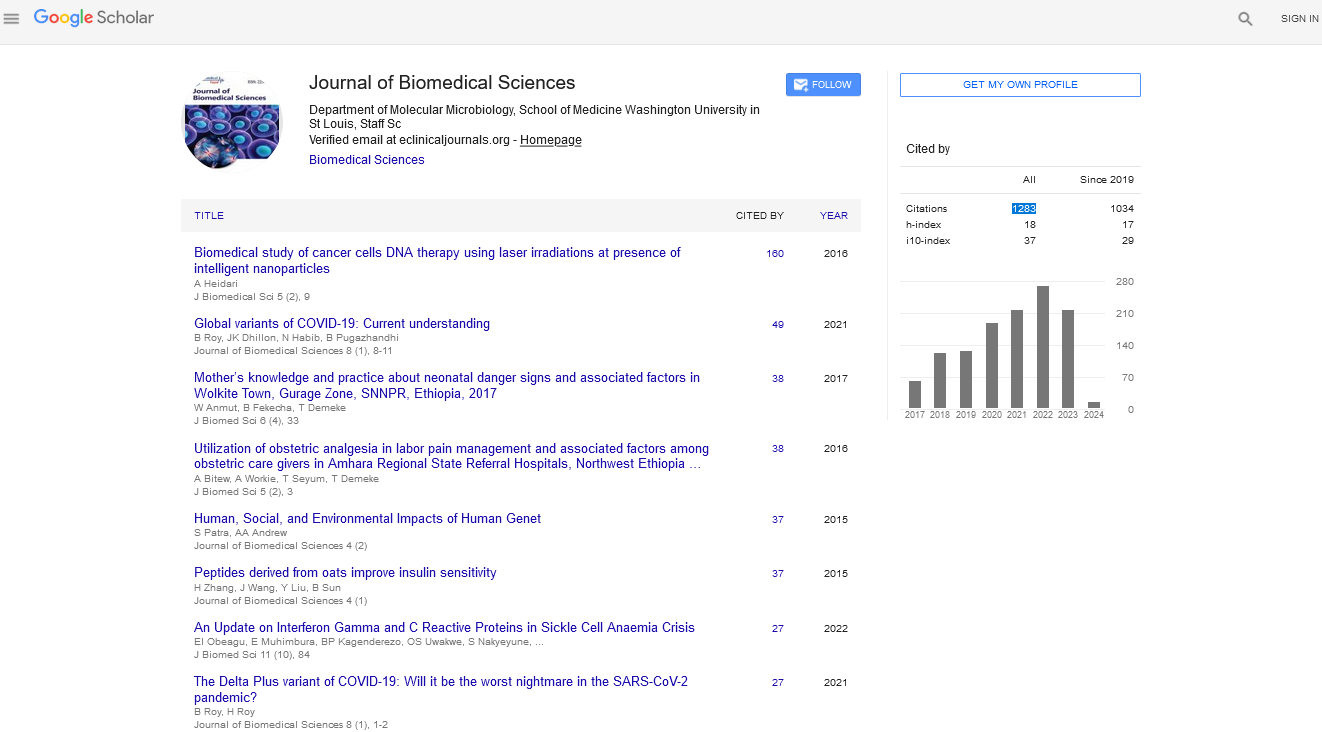Commentary - (2024) Volume 13, Issue 6
Pharmacogenomics and Its Role in Personalized Medicine
Vanessa Clifford*
Department of Clinical and Biomedical Sciences, Monash University, Melbourne, Australia
*Correspondence:
Vanessa Clifford, Department of Clinical and Biomedical Sciences, Monash University, Melbourne,
Australia,
Email:
Received: 15-Nov-2024, Manuscript No. IPJBS-24-15317;
Editor assigned: 19-Nov-2024, Pre QC No. IPJBS-24-15317 (PQ);
Reviewed: 03-Dec-2024, QC No. IPJBS-24-15317;
Revised: 13-Dec-2024, Manuscript No. IPJBS-24-15317 (R);
Published:
20-Dec-2024
Description
Pharmacogenomics is a rapidly evolving field of study that
focuses on how an individual’s genetic makeup influences their
response to medications. By understanding the genetic factors
that affect drug metabolism, efficacy, and safety,
pharmacogenomics plays a crucial role in the development of
personalized medicine. This approach aims to tailor medical
treatment to the individual characteristics of each patient,
enhancing therapeutic outcomes and minimizing adverse
effects. This article explores the principles of pharmacogenomics,
its applications in personalized medicine, and its potential to
revolutionize healthcare.
Understanding pharmacogenomics
Pharmacogenomics is a subfield of pharmacogenetics, which
studies the role of genetic variation in drug response. It
encompasses a range of genetic factors, including Single
Nucleotide Polymorphisms (SNPs), gene copy number variations,
and epigenetic modifications. These variations can affect various
aspects of drug response, including:
Drug absorption: Genetic factors can influence how well a
drug is absorbed in the body.
Drug metabolism: Enzymes involved in drug metabolism,
particularly in the liver, can exhibit genetic polymorphisms that
affect drug clearance and bioavailability.
Drug efficacy: Genetic differences may alter the target
receptors or pathways involved in drug action, impacting its
effectiveness.
Adverse drug reactions: Genetic variations can predispose
individuals to experience side effects from medications, ranging
from mild to severe reactions.
By identifying and understanding these genetic variations,
healthcare providers can make informed decisions about drug
selection and dosing, ultimately improving patient care.
The role of pharmacogenomics in personalized
medicine
Personalized medicine seeks to optimize medical treatment
by considering individual variability in genes, environment, and lifestyle. Pharmacogenomics is a foundational component of
personalized medicine, providing insights into how genetic
factors influence drug response and allowing for more tailored
therapeutic approaches.
Drug selection and dosing: Pharmacogenomic testing can
guide clinicians in selecting the most appropriate medications
for patients. For instance, genetic tests can identify which
patients are likely to respond well to specific antidepressants or
anticoagulants. By determining the optimal drug choice and
dosage, healthcare providers can enhance therapeutic efficacy
while minimizing the risk of adverse effects.
Reducing adverse drug reactions: Adverse Drug Reactions
(ADRs) are a significant concern in clinical practice, leading to
increased healthcare costs and patient morbidity.
Pharmacogenomic testing can help identify patients at higher
risk for ADRs. For example, variations in the HLA-B gene can
predispose individuals to severe hypersensitivity reactions to
certain medications, such as carbamazepine and abacavir. By
screening for these genetic markers before prescribing,
healthcare providers can reduce the incidence of harmful
reactions.
Cancer treatment: Pharmacogenomics has a profound impact
on cancer treatment, where tailored therapies based on genetic
profiles can significantly enhance treatment outcomes. For
instance, the presence of specific mutations in the EGFR gene
can predict responsiveness to targeted therapies like gefitinib
and erlotinib in non-small cell lung cancer. Similarly, the
identification of HER2 gene amplification allows for the use of
trastuzumab in HER2-positive breast cancer patients. By
leveraging pharmacogenomic data, oncologists can make more
informed treatment decisions, ultimately improving survival
rates and quality of life.
Current applications of pharmacogenomics
Pharmacogenomics is already being integrated into clinical
practice across various therapeutic areas. Several key examples
illustrate its current applications:
Cardiovascular medicine: In cardiovascular medicine,
pharmacogenomic testing can optimize the use of anticoagulants
like warfarin. Variations in the CYP2C9 and VKORC1 genes
influence warfarin metabolism and sensitivity, respectively.
Testing for these genetic variants allows healthcare providers to
tailor warfarin dosing, reducing the risk of bleeding
complications and improving therapeutic outcomes.
Psychiatry: In psychiatry, pharmacogenomics is increasingly
utilized to guide antidepressant treatment. Genetic variations in
the CYP450 enzyme system can affect the metabolism of various
antidepressants, leading to variability in drug response. For
example, patients with reduced CYP2D6 activity may require
lower doses of certain Selective Serotonin Reuptake Inhibitors
(SSRIs) to avoid adverse effects. By using pharmacogenomic
testing, psychiatrists can enhance treatment efficacy and
minimize trial and error prescribing.
Infectious diseases: Pharmacogenomics is also playing a vital
role in the treatment of infectious diseases. For example, testing
for the UGT1A1 gene can help determine the appropriate dosing
of the antiviral drug irinotecan in cancer patients. Additionally, pharmacogenomic insights can guide the selection of antiretroviral
therapy for patients with HIV, optimizing treatment and improving
adherence.
Pharmacogenomics represents a paradigm shift in medicine,
offering the potential to personalize drug therapy based on
individual genetic profiles. By understanding how genetic
variations influence drug metabolism, efficacy, and safety,
healthcare providers can optimize treatment strategies, reduce
adverse drug reactions, and enhance patient outcomes. As the
field continues to evolve, addressing challenges related to cost,
accessibility, and education will be essential for fully realizing
the promise of pharmacogenomics in personalized medicine.
With ongoing research and integration into clinical practice,
pharmacogenomics is poised to transform healthcare, leading to
safer, more effective, and personalized treatments for patients.
Citation: Clifford V (2024) Pharmacogenomics and Its Role in Personalized Medicine. J Biomed Sci Vol:13 No:6





